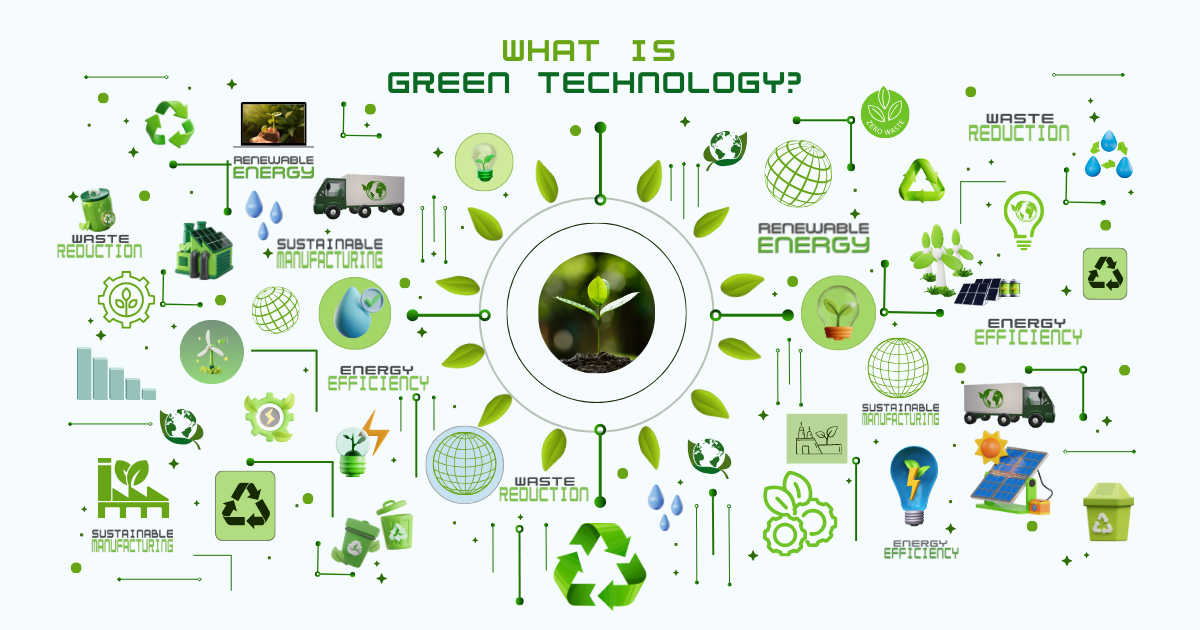
s environmental concerns escalate globally, businesses are adopting sustainable practices to reduce their ecological footprint. Green technology, the use of environmentally friendly innovations and methods, plays a crucial role in driving sustainability. In today’s digital age, the adoption of these technologies is not only critical for the environment but also serves as a differentiating factor in SEO (Search Engine Optimization). Brands that prioritize sustainability are increasingly favored by search engines and consumers alike. As a professional SEO specialist, aligning your strategies with sustainable practices is becoming essential.
In this article, we will delve into how green technology impacts sustainability, explore its benefits, and reveal how SEO professionals can leverage this movement to enhance a brand’s visibility, trustworthiness, and long-term success.
The Rise of Sustainability and Its Importance
Sustainability involves meeting present needs without limiting the ability of future generations to meet theirs. It involves balancing environmental, social, and economic factors to create a future where resources are used wisely and efficiently.
The increasing awareness of climate change, resource depletion, and pollution has propelled sustainability to the forefront of societal priorities. Consumers are more informed and concerned about how businesses impact the planet. This shift in mindset has led to the rise of the “eco-conscious consumer,” influencing purchasing decisions and, by extension, how businesses operate.
For businesses, sustainability is no longer optional. Companies that do not adapt risk being left behind as consumer demand grows for eco-friendly products and services. A company’s environmental footprint, corporate social responsibility (CSR), and transparency in its operations are becoming key factors in consumer loyalty.
SEO specialists must recognize that sustainability is not only a moral obligation but also a significant opportunity to improve brand positioning, build trust with consumers, and boost organic visibility. Green technology serves as the foundation for sustainable practices, allowing businesses to operate efficiently while reducing environmental impact.
What Is Green Technology?
Green technology, often referred to as “cleantech” or “environmental technology,” encompasses a wide array of innovations aimed at reducing pollution, conserving natural resources, and fostering energy efficiency. From renewable energy sources like solar and wind power to water purification systems and eco-friendly manufacturing processes, green technology is the bedrock of sustainable business operations.
The main pillars of green technology include:
◊ Renewable Energy: Utilizing natural sources like sunlight, wind, and water to generate electricity, thus reducing reliance on fossil fuels.
◊ Energy Efficiency: Developing systems and devices that require less energy to perform the same function, reducing waste and conserving power.
◊ Waste Reduction: Implementing processes that minimize waste through recycling, upcycling, and creating products with longer lifespans.
◊ Sustainable Manufacturing: Creating products with eco-friendly materials and processes that minimize environmental impact.
Constructing buildings that optimize energy use, reduce carbon footprints, and incorporate sustainable materials.
Sustainability in SEO: Why It Matters
Google and other search engines are constantly evolving to meet user demands. Consumers are now seeking transparency in how businesses manage their environmental responsibilities. Search engines are responding by favoring websites and content that reflect sustainable practices.
Here’s how sustainability and green technology intersect with SEO:
A. User Intent and Eco-Friendly Search Queries
Consumer interest in sustainability has led to an increase in search queries related to eco-friendly products, services, and practices. Search terms like “sustainable packaging,” “green energy solutions,” or “zero-waste businesses” are becoming increasingly popular. Businesses that align their content with these queries are more likely to attract a larger, environmentally-conscious audience.
SEO specialists can optimize content by targeting keywords that reflect this intent, improving a brand’s relevance in search results.
B. Search Engine Algorithms and Sustainability
Search engines are increasingly focusing on user experience (UX) and how websites adhere to environmental standards. Google, for example, has emphasized page speed, mobile-friendliness, and energy-efficient hosting services as ranking factors.
Websites powered by green hosting providers—those that use renewable energy to run their servers—can gain an edge in rankings. Additionally, faster-loading websites and eco-friendly web designs offer better user experiences, reducing bounce rates and improving SEO performance.
C. Backlink Opportunities and Green Partnerships
Building backlinks from reputable, sustainability-focused websites can significantly improve a brand’s authority and search rankings. Many industry-leading publications focus on environmental issues, providing opportunities to establish partnerships and guest posting arrangements that promote a company’s green initiatives.
High-quality backlinks from green technology or sustainability blogs signal to search engines that a brand is trustworthy and aligned with eco-conscious trends.
D. Local SEO and Green Businesses
Sustainability is often closely linked to local business practices. Consumers are increasingly interested in supporting eco-friendly businesses within their communities. Local SEO can benefit from this trend by optimizing Google My Business listings with keywords such as “sustainable,” “eco-friendly,” or “green.”
Businesses can also promote their use of green technology or sustainable practices through local content, blog posts, and community engagement initiatives. This strategy can improve local rankings and attract environmentally-conscious customers.
Key Areas Where Green Technology Impacts SEO
Green technology offers several opportunities for SEO professionals to enhance a brand’s online presence while supporting sustainability. Let’s explore the key areas where green technology intersects with SEO:
1. Eco-Friendly Website Design
The design and functionality of a website contribute directly to its environmental footprint. Websites that are optimized for speed and efficiency consume less energy, resulting in a more sustainable online presence. Search engines like Google prioritize fast, user-friendly websites, and green technology can help achieve these goals.
- Energy-Efficient Hosting: Choosing a green web hosting provider that uses renewable energy sources can enhance SEO by aligning with sustainability trends. Some search engines favor websites hosted by eco-friendly services.
- Optimized Code: Reducing excessive code, compressing images, and using efficient caching techniques can improve site speed and reduce energy consumption.
- Mobile Optimization: As mobile traffic increases, having a mobile-friendly website is crucial. An optimized mobile design reduces load times, conserves data, and improves user experience, all of which positively impact SEO.
2. Sustainable Content Creation
Content is the cornerstone of SEO, and producing sustainable content can boost a website’s long-term visibility. Content focused on sustainability and green technology is increasingly sought after by consumers and search engines alike.
- Eco-Friendly Keywords: Targeting keywords related to sustainability, such as “green technology,” “renewable energy,” and “zero-waste solutions,” can attract an eco-conscious audience. Incorporating these terms into content helps improve rankings for environmentally focused search queries.
- Evergreen Content: Producing long-lasting, high-quality content around green topics, such as guides on reducing carbon footprints or the benefits of eco-friendly products, ensures that content remains relevant over time, attracting ongoing organic traffic.
- Content Recycling: Repurposing older content by updating it with current trends in sustainability reduces the need for constant new content creation and supports eco-friendly content practices.
3. Green Link-Building Opportunities
Building backlinks is a key SEO strategy, and aligning with sustainability can open doors to new linking opportunities from high-authority, eco-conscious websites.
- Partnerships with Green Organizations: Collaborating with sustainability-focused NGOs, industry influencers, or eco-friendly brands can result in backlinks from reputable sources, boosting domain authority and search engine rankings.
- Sustainability Campaigns: Launching green initiatives or campaigns can attract attention from media outlets, bloggers, and industry leaders, providing opportunities for natural link-building and media coverage.
- Green Certifications: Businesses that achieve certifications for sustainability efforts, such as carbon-neutral status or renewable energy usage, can promote these achievements in content and attract backlinks from relevant industry publications.
4. Improved User Experience (UX) and Page Speed
Green technology directly influences website performance, which is a key factor in SEO rankings. A faster, more efficient site improves the user experience, leading to better engagement metrics and higher search rankings.
- Reduced Bounce Rates: Websites optimized for speed and sustainability provide a better user experience, which can reduce bounce rates—a factor that search engines use to evaluate a site’s relevance.
- Energy-Efficient Design: By minimizing resource-heavy elements like large images, videos, and excessive plug-ins, websites load faster and consume less energy, benefiting both the environment and SEO rankings.
- Core Web Vitals: Google’s Core Web Vitals, which measure page load times, interactivity, and visual stability, are essential for SEO. Green technology practices like reducing server load and optimizing website performance help meet these metrics.
5. Local SEO and Sustainable Businesses
Local SEO strategies can benefit from promoting sustainability initiatives, especially as consumers increasingly seek out eco-friendly businesses in their communities.
- Google My Business Optimization: Businesses can highlight green initiatives, such as using renewable energy or offering sustainable products, in their Google My Business profiles. Keywords like “eco-friendly” or “sustainable” can improve local search rankings and attract customers seeking environmentally responsible companies.
- Local Partnerships: Collaborating with local green organizations or participating in community sustainability events can increase brand visibility and generate backlinks from local websites or news outlets, benefiting both SEO and community relations.
6. Sustainability as a Trust Factor
Trust is critical in SEO, and green technology can enhance a brand’s reputation by demonstrating a commitment to sustainability.
- Transparency and CSR: Highlighting corporate social responsibility (CSR) efforts related to sustainability, such as waste reduction, energy efficiency, or ethical sourcing, helps build trust with both users and search engines.
- Sustainability Certifications: Featuring sustainability certifications or eco-labels on a website can serve as trust signals, enhancing a brand’s credibility and improving its SEO performance.
- Positive Reviews: Consumers increasingly leave reviews based on a company’s environmental impact. Positive reviews that mention a company’s sustainable practices can boost SEO by improving local search rankings and click-through rates.
Green Technology Trends to Watch
As the sustainability movement continues to evolve, several green technologies are emerging that will have a profound impact on the SEO landscape. Businesses that stay ahead of these trends can differentiate themselves in an increasingly competitive market.
>Artificial Intelligence (AI) and Energy Efficiency
AI plays a critical role in optimizing energy consumption in businesses, from managing data centers to improving supply chain logistics. AI can analyze massive datasets to identify energy inefficiencies and offer real-time solutions for reducing waste.
For SEO specialists, AI-powered tools can enhance keyword research, competitor analysis, and content optimization, making campaigns more efficient and reducing the need for manual labor.
>Blockchain for Sustainable Supply Chains
Blockchain technology is transforming how businesses track their environmental impact by providing transparent records of materials used in products and their journey through the supply chain. This transparency is essential for building trust with eco-conscious consumers.
Brands that adopt blockchain can highlight their commitment to ethical sourcing, improving their appeal and SEO performance as consumers increasingly prioritize sustainability in their purchasing decisions.
>Electric Vehicles (EVs) and Smart Cities
The rise of electric vehicles and smart city infrastructure is redefining transportation and urban living. As more cities adopt green technology solutions, businesses must adapt by optimizing their local SEO strategies to attract customers interested in these innovations.
For example, businesses that install EV charging stations or partner with smart city initiatives can promote these services through their SEO strategies, targeting relevant keywords and local search queries.
Measuring the Impact of Sustainability on SEO
Measuring the success of sustainability-driven SEO efforts requires tracking both traditional SEO metrics and key performance indicators (KPIs) related to sustainability initiatives.
A. Organic Traffic and Ranking Improvements
By optimizing for sustainability-focused keywords, businesses can monitor improvements in organic traffic and rankings. Tracking keyword performance related to eco-friendly products and services will show how well a company is resonating with its target audience.
B. User Engagement and Bounce Rates
A sustainable website that is fast, easy to navigate, and powered by green hosting will likely see improved user engagement. Monitoring metrics like average session duration, bounce rate, and conversion rates can help businesses gauge the effectiveness of their eco-friendly design efforts.
C. Backlink Profile Growth
As brands partner with sustainability-focused organizations and earn high-quality backlinks, SEO specialists should monitor the growth of their backlink profile. Tools like Ahrefs and Moz can help track new referring domains, the authority of those domains, and their impact on rankings.
Conclusion: Embracing Green Technology for Long-Term SEO Success
Sustainability is no longer a trend but a necessity for businesses that want to thrive in the modern economy. Green technology offers an opportunity to create more efficient, responsible operations that resonate with eco-conscious consumers and search engines alike.
For SEO specialists, aligning strategies with sustainability efforts is a win-win—improving a brand’s reputation while driving organic traffic and rankings. From eco-friendly web design to green content creation and sustainable link-building strategies, there are numerous ways to incorporate sustainability into an SEO strategy.
By staying ahead of green technology trends and capitalizing on the growing demand for environmentally responsible businesses, SEO professionals can position their clients for long-term success in an increasingly competitive and conscious marketplace.



